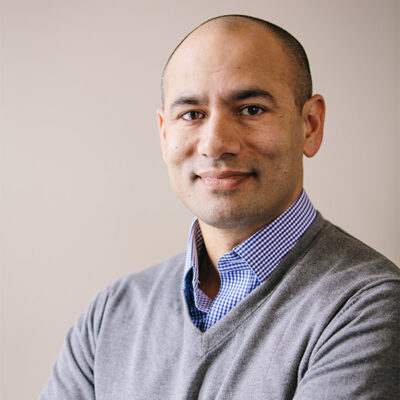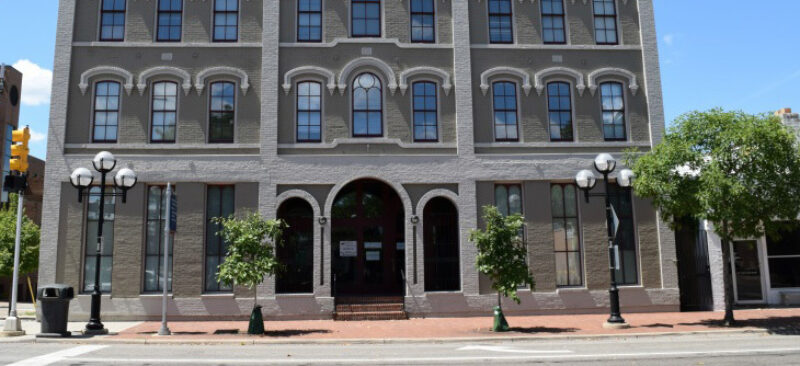June 04, 2020

by Neel Hajra, Former AAACF CEO
Amid an avalanche of bad news, from pandemic to racial injustice, nothing illustrates better the tension in my head right now than deciding whether to start my remarks with “As a person of color” or “As a person of privilege.” Two choices, equally valid, but so deeply different in meaning and implication.
As a person of color, my story begins with my immigrant parents. My father started his journey to the US from rural India on an ox cart (almost too Hollywood, right?). He met my mother, also from India, and they married in the US outside the traditional Indian boundaries of caste and arranged unions. I guess you could say they discovered the American way. To that end, they taught me how our people’s liberator, Mahatma Gandhi, influenced the global liberation movement from Mandela to MLK. We are all so proud to be American, and we revere the principles of justice, equality and prosperity through hard work. But make no mistake – we will always be “others” despite settling in Ann Arbor (my birthplace) where people have embraced diversity my entire life. While I didn’t face my parents’ language and cultural hurdles, my awareness of being non-white is ever-present. From the way the world interacts with my own multiracial family (just last year an airport security guard refused to believe I was the father of my step daughter), to people puzzling over “what are you?,” I’ve learned that my skin color impacts my existence whether I want it to or not. I generally don’t think of this as a big deal and choose to smile at and shrug off the occasional downsides of being an “other,” which reveals the second version of me.
As a person of privilege, thanks to having ready access to life’s necessities and so much more, I bought into the American Dream. For a long time I felt everyone, regardless of background, could embrace the same principle that inspired my parents and me: In America, work hard and good things happen. It drove my parents’ success and comfort, and now it drives mine (and yes, my three teenagers are sick of my speeches on the topic). But the hard-fought bubble of privilege created by my parents and perpetuated by me also distorted my perceptions of a harder reality: Not everyone gets out of life what they put into it. Not everyone can shrug off the indignities that come with being an “other.” Not everyone has access to the American Dream that my family holds so dear. Worse yet, despite my best intentions, my privilege has softened my sense of urgency around a deeper truth: The color of one’s skin can dictate life or death in the US, especially for African Americans. We see it in the disparate racial impacts of the pandemic. We see it in the unjust deaths of George Floyd, Ahmaud Arbery and so many others. Nothing like this should ever be tolerated in America, and yet I’ve unwittingly been a part of a privileged majority that has done just that through selective memory, blind spots, and inaction.
So now I choose to bring closer together my two selves, to productively merge my other-ness with my privilege. There should be less tension and greater clarity around my senses of justice and equity. Perhaps it’s not coincidental that a similar tension exists within the institution I serve, the Ann Arbor Area Community Foundation. I understand that a growing number of people view foundations as a concentration of wealth and protectors of the status quo. And there’s some inherent truth to that by dint of being a financial institution rooted in perpetuity. However, as a community foundation, we have always been by the people (15,000+ donors and 400+ annual volunteers) and for the people (nearly 1,500 nonprofits supported throughout our history). I believe our mission of “enriching quality of life” is inherently anti-status quo because bettering people’s lives in a lasting way implicitly requires change.
Community foundations evolve alongside our communities. AAACF has been quietly and methodically laying the groundwork of diversity and inclusion for several years internally (both our board and staff now better reflect the rich racial and ethnic tapestry of our community) and externally (a wide range of “community voice” projects that seek to enable those we purport to help to teach us how to do so). We are engaged in a range of activities that incorporate racial equity priorities: Our Community Scholarship Program, our In the Neighborhood program, our Coordinated Funding partnership, ongoing support for NEW’s Champions for Change, decades of grants by the African American Endowment Fund, partnering with Washtenaw My Brothers Keeper, and recent pandemic response grants for groups led by people of color. We’ve also been sharing existing and newly commissioned data to shine a light on racial and other inequities within Washtenaw County to help fellow residents understand the depth of challenge even in a community as seemingly prosperous as ours. We’re still learning and growing, but we’ve come a long way.
Now is the time for the next chapter in the Foundation’s journey. It’s time to build on our evolving nature as an institution, acknowledge and leverage our privilege, lean into our mission and ideals, and start making the kind of deeper change that our community and country need. This summer our board and staff are embarking on an exploration of new values that will drive AAACF forward, and this fall we will engage in values-driven strategic planning that will help make AAACF an even stronger force for good. In the meantime, I welcome your feedback on how we can continue to relentlessly push forward so that the outcomes of AAACF’s work more closely align with our aspiration of a better community for all.
The Foundation gives me an outlet to express myself through actions and outcomes rather than words, and I much prefer the walking over the talking, so to speak. Sharing my inner struggle is a deeply uncomfortable act — but I accept, more than ever, that discomfort is a necessary component of positive change, both individually and as a community. The tension within me will never really go away, so I resolve to keep listening, reflecting, and evolving as a person and as a leader in the belief that good will result for me and for the hometown community I love.

